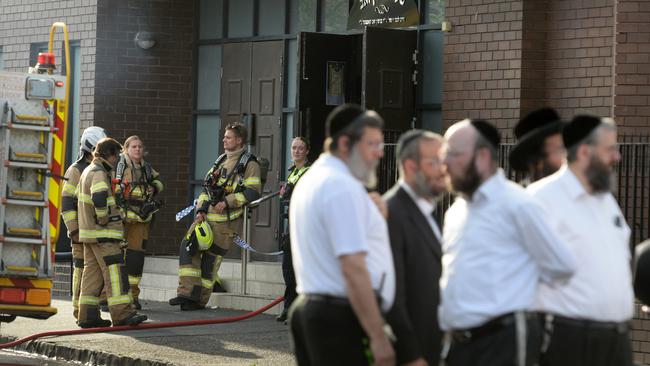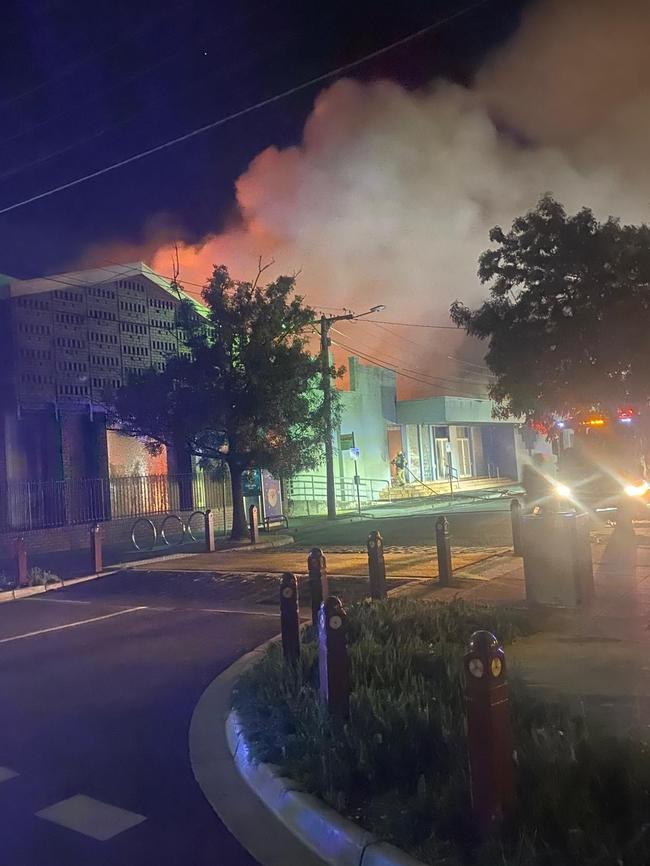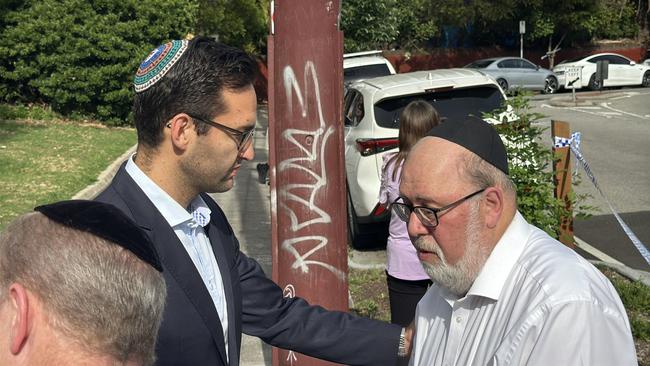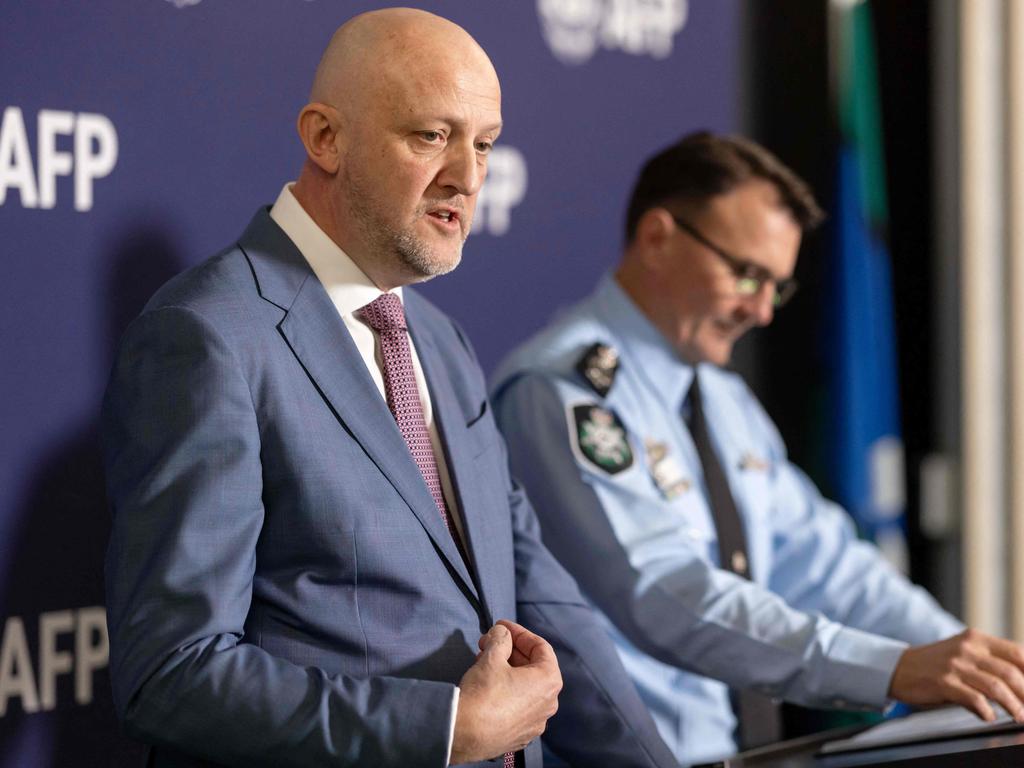When synagogues start burning its hard to ‘cherish’ social cohesion
Labor’s anti-Israel position has evolved beyond any rational calculation of domestic politics or foreign policy. It is instead scratching a far-left ideological itch.

A synagogue is torched in Melbourne, a car immolated in Sydney and others vandalised. An aggressive, drum-banging pro-Palestinian mob sets up a three-hour protest outside Sydney’s Great Synagogue. Of course it’s the sole Israeli flag-carrying Jew who gets pushed away by the police.
What we don’t see reported is the relentless pressure on our Jewish citizens. The young children who practise weekly security drills at schools anticipating an attack. The deluge of anti-Jewish hate online. The family decisions not to go into the city today, not to wear a Star of David, to stay at home wondering if they have a future in this country.
What happens on the street is enabled by our government’s hard-turn against an old friend, Israel. When Australia shifts a vote in the United Nations towards the creation of Palestine, the gesture rewards terrorism and punishes Israel for the sin of being attacked.
In time we will discover the precise cause of the burning of the Adass Israel Synagogue of Melbourne in Ripponlea, but at the outset it’s clear that this is just the latest assault on the Jewish community.
It is deeply disturbing that almost no one in government seems able to muster a convincing display of concern or compassion towards our Jewish citizens.
Education Minister Jason Clare was the first out of the blocks on Friday with the government’s favourite talking point: “Let’s call it out, there is no place for this in Australia. I hope that the police catch the perpetrators.”
Yes, let’s “call it out”, Minister Clare. How courageous of you. It seems plain that there is indeed a place for anti-Jewish violence in Australia. The place is on the streets of our major cities.
The violence and threats of violence are becoming normalised as part of a pattern of popular protest. Governments and police seem not just incapable of dealing with it, but also not that motivated.

Let’s conduct a thought experiment: Imagine that, instead of a synagogue being torched, it was a mosque, a Hindu temple or, for goodness’ sake, a Beijing-funded Confucius Centre being destroyed by masked figures sloshing accelerant at the front door.
My instinct is that government ministers would be elbowing first responders out the way to have their outrage recorded for all of us to see. Such acts would be seen as an assault on the social compact – that delicate construct of multiculturalism, forever to be celebrated.
In practice, the emerging norm is “me too, but not the Jews”. It seems there is a special place of disregard for a people who have been community builders in this country since the First Fleet.
What happens next? Three trends are evident. First, there is a clear pattern for the anti-Israel (in reality anti-Jewish) protest movement to become more aggressive.
I have tracked this for the past 14 months in columns for this newspaper. An unlikely coalition of protest movements spanning Islamist radicals and Marxist “progressives” has formed.
In their size, persistence and vehemence these groups have intimidated our police forces. They have established a “right” to be permanently disruptive on our streets.
Given this freedom of movement these groups have developed a tough leadership core, they have radicalised individuals – because leaders need street fighters – and learned to keep pushing the boundaries of tolerated behaviour.
The link between protest and criminal behaviour remains publicly opaque but will be clear enough to our domestic security agencies. We see the results in increasingly violent and intimidatory acts, which will keep ramping up unless more active measures are taken to stop them.

The second trend is that the government is going to continue to push its anti-Israel activity internationally in the UN, by denying visas to Israeli politicians and doing whatever it can to bruise bilateral relations with Jerusalem.
I’m not sure if this wins Albanese any votes beyond those already rusted on to Labor. It certainly loses the votes of those who hate this punitive assault on a democratic partner. Labor’s anti-Israel position has evolved beyond any rational calculation of domestic politics or foreign policy. It is instead scratching a far-left ideological itch that has played around Labor internal politics for decades.
To hell with the pretence of bipartisanship: Labor’s left, led by Penny Wong intellectually and Anthony Albanese emotionally, are having fun while they still can with an old ideological fixation of bashing Israel.
This agenda is damaging politically, but addresses an internal party need. The government will not or cannot accept that it sets the context for the rise of anti-Jewish sentiment in Australia.
Trend three is that our police and domestic security services don’t know how to deal with the rising violence. The scale of the protest movement makes it challenging to think about harder policing – what if the mob pushes back?
And remember that it was only last August that ASIO’s Mike Burgess was trying to expunge the idea of jihadist or Islamist violence and to replace it with the term “politically motivated violence”.
This was apparently an attempt, in the words of Prime Minister Albanese, to “lower the temperature of debate … social cohesion cannot be taken for granted, it must be nourished and it must be cherished as a national asset”.
It’s hard to nourish and cherish social cohesion when the synagogues start burning. We need a tougher approach to internal security.
More street violence, a government pursuing a hard-line ideological agenda and security agencies confused about their fundamental roles. These trends will continue and worsen as we move into 2025.
Peter Jennings is director of Strategic Analysis Australia and was executive director of the Australian Strategic Policy Institute from 2012 to 2022. He is a former deputy secretary for strategy in the Defence Department (2009-12).







Almost everyday brings a fresh assault on Australia’s Jewish population.